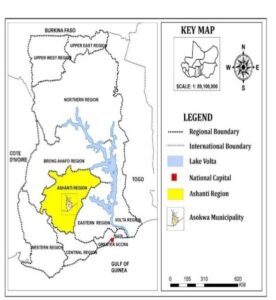Background
The Asokwa Municipal Assembly (ASKMA) was established from the Kumasi Metropolitan Assembly (KMA) by a Legislative Instrument (L.I.) 2294, 2018, as per an Act of Parliament on December 21, 2017, under section 3 of the Local Governance Act, 2016 (Act 936). The Assembly began operations on March 15, 2018. The Municipality comprises 18 towns grouped into 3 Zonal councils (Asokwa, Ahinsan, and Atonsu) and is divided into 12 Electoral Areas within the Asokwa Constituency.
Map of Asokwa Municipal

Situated in the center of the Ashanti Region, Asokwa Municipal covers an estimated land area of 23.04 square kilometers, representing about 0.094% of the region’s total land area. The Municipality is bordered by Oforikrom to the East, Subin to the North West, Nhyiaeso to the West, and Bosomtwe District to the South. Major communities include Atonsu, Kaase, Ahinsan, Kuwait, and Fabi/Dompoase.
Local Government
The Asokwa Municipal Assembly, the highest administrative and political body in the Municipality, operates under the Local Governance Act, 2016 (Act 936). The General Assembly consists of 18 members, including 12 elected and 6 appointed by the state. The Assembly performs executive functions through its Executive Committee, chaired by the Chief Executive and comprising the heads of various sub-committees and an ad-hoc committee.
Economic Activities
The economy of Asokwa Municipal is driven by Agriculture, Industry, and Commerce/Services, with a significant emphasis on retail and wholesale trading. Industrial activities are concentrated around the Kaase Light Industrial area, while agricultural activities have declined due to land competition. The private sector employs most of the population, with 91.2% of the gainfully employed working in the private sector, and 79.2% engaged in informal economic activities.
transportation Networks
The Municipality’s transportation network includes ‘trotro’ and taxis as major means of transport, with the GPRTU and PROTOA being the main transport systems. The road network spans 73km, categorized into first, second, and third-class roads. Despite private sector dominance, transportation faces challenges such as inadequate enforcement of road traffic regulations, resulting in reckless driving and traffic jams. Improvement and regulation of transport activities are crucial for economic benefits.
telecommunication Services
Asokwa Municipal has stable telecommunication services, including mobile and fixed-line networks, with access to 3G and 4G networks. Internet cafes are available within the Municipality.
Religion and Ethnic Groups
Christianity is the predominant religion, with Muslims and practitioners of African Traditional religion also present. The main ethnic groups are the Akans, Krobos/Dangbes, and Ewes, interspersed with Gas, Hausas/Northerners, and Guans.
Water Security
The Municipality sources its water from the Owabi and Barekese water treatment plants, serving the Kumasi Metropolis and ten adjoining districts. Owabi operates at full capacity, while Barekese has expansion potential.
Education
Asokwa Municipal has a mix of public and private educational institutions. The public sector includes 13 pre-schools, 19 primary schools, 22 junior high schools (JHS), and one senior high school (SHS). The private sector has 77 pre-schools, 73 primary schools, 46 JHS, and 3 SHS. Enrollment statistics show varying levels of gender representation across different educational stages.
Municipal Health Systems
Health Administration
The Municipal Health Directorate comprises key staff including a Municipal Director of Health Services, public health nurses, an accountant, and various health officers. Responsibilities include health management, planning, monitoring, and resource management within the municipality.
Challenges
The health system faces several challenges, including limited facilities, insufficient funds for utility bills, lack of basic logistics, and inadequate accommodation for health personnel.
CHPS Zones
The Municipality has 17 CHPS Zones, each managed by outreach staff reporting on their activities and implementation of the action plan during monthly/quarterly meetings.
Planning And Evaluation
The Municipal Health Management Team (MHMT) formulates annual action plans aligned with national and regional goals, guiding service delivery and administration. These plans also serve as evaluation tools for district performance.
Supervision And Monitoring
A district monitoring team conducts quarterly supervisory visits to sub-districts, providing feedback on strengths and weaknesses based on a league table.
Financial Administration
The main income sources include government financial encumbrance, internally generated funds, and donor funds. Allocations are made directly to budget and management centers from the Ghana Health Service headquarters, with annual audits conducted by the Auditor General’s department.
Key Statistics
Demography
The population of Asokwa Municipality is 130,975, with key demographic segments such as women in fertility age, expected pregnancies, and children under five years old.
Vital Statistics
Health indicators include infant mortality rates, under-five mortality rates, neonatal mortality rates, and maternal mortality ratios. Data indicates trends and fluctuations over the past three years.
| Indicator (per 1000 live births) | 2021 | 2022 | 2023 |
|---|---|---|---|
| Infant Mortality Rate | 12.2 | 18.2 | 14.1 |
| Under five mortality Rate | 1.5 | 1.2 | 2 |
| Neonatal Mortality Rate | 14 | 12 | 11.3 |
| Maternal mortality ration (per 100,000) | 56 | 195 | 213 |
health Infrastructure And Services Output
The Municipality has various health facilities, including hospitals, health centers, clinics, and CHPS zones. Health service output indicators track doctor and nurse ratios, outpatient insurance coverage, and community health planning services.
Public Health Services
Public health indicators track malaria testing, PMTCT testing coverage, Penta 3 coverage, measles-rubella coverage, TB case notification, and treatment success rates.
Reproductive Health Services
Reproductive health indicators include ANC registrants, HIV and syphilis testing, ARV treatment, and TB screening results.
Major Causes Of Morbidity
Common causes of morbidity include hypertension, malaria, anemia, and other diseases, with data tracking the prevalence and treatment outcomes over recent years.



